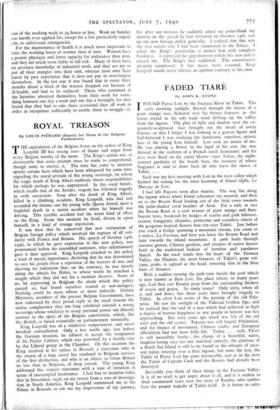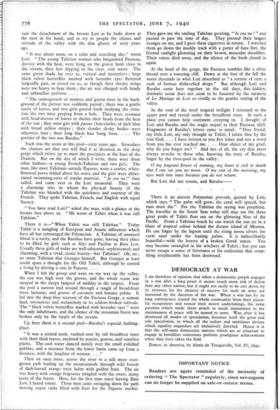FADED TIARE
By JOHN K. STONE
IFOUND Pierre Loti by the Fautaua River in Tahiti. The 1 early morning sunlight, filtered through the leaves of a great mango tree, flickered over his bronze features as the leaves stirred in the soft trade wind drifting up the valley from the lagoon. The play of light and shadow over the ex- quisitely-sculptured face brought out the detail of every feature, so that I forgot I was looking at a graven figure and half-believed I was studying the handsome, sensitive, artistic face of the young Loti himself. Lou took no notice of me. He was placing a flower in the lapel of his coat (he was dressed in the uniform of a French naval lieutenant) and his eyes were fixed on the starry bloom—tiare Tahiti, the night- scented gardenia of the South Seas, the memory of whose fragrance is said to draw back all who leave the shores of Tahiti. . . .
Such was my first meeting with Loti in the river-valley which formed the setting for the most haunting of Island idylls, Le Manage de Loti.
I had left Papeete soon after sunrise. The way lies along the lagoon where white Island schooners are moored, and then on to the Broom Road leading out of the little town towards the palm-shaded coral beaches of Artie. For a mile or two the Broom Road is a cool avenue of giant mango and flam- boyant trees, bordered by hedges of scarlet and pink hibiscus, creamy frangipani, oleander, poinsettia and countless others of the gorgeous tropical flowers that riot over Tahiti. Just before you reach a bridge spanning a mountain stream, you come to a notice, La Fautaua, and here you leave the Broom Road and turn towards the inland mountains. A path leads through coconut groves, Chinese gardens, and clusters of native houses built in the traditional fashion of bamboo and pandanus thatch. As the track winds into the heart of the Fautaua Valley, the Diadem, the most fantastic of Tahiti's great vol- canic peaks, is sighted at the head, towering dim in the blue haze of distance.
With a sudden turning the path runs beside the pool which is now known as Bain Loti, the place where, so many years ago, Loti first saw Rarahu peep from the surrounding thickets of acacia and guava. So many years? Only sixty, when all is said and done; but those years have brought tragedy to Tahiti. In 1876 Loti wrote of the passing of the old Poly- nesia. He saw the twilight of the Tahitian Golden Age, and he realised that the end of a race which had achieved as high a degree of human happiness as any people in history was fast approaching. But sixty years ago much was left of the old ways and the old scenes. Papeete was still largely Polynesian, and the impact of missionary, Chinese trader, and European officialdom had not been fully felt. Today . . . well, Tahiti is still incredibly lovely ; the charm of a beautiful, naive, laughter-loving race has not vanished entirely; the glamour of a South Sea Island is still to be found in the whisper of coco- nut palms swaying over a blue lagoon; but none the less, the Tahiti of Pierre Loti has gone irrevocably, just as in his time the Tahiti of Captain Cook and the Bounty had already been destroyed.
Inevitably you think of these things in the Fautaua Valley. It is of no avail to get angry about it all, and it is useless to shed sentimental tears over the story of Rarahu, who symbo- lises the greater tragedy of Tahiti itself. It is better to culti- vate the detachment of the bronze Loti as he looks down at the tiare in his hand, and to try to people the silence and solitude of the valley with the dim ghosts of sixty years ago.
" It was about noon, on a calm and scorching day," wrote Lou. " The young Tahitian women who frequented Fautaua, drowsy with the heat, were lying on the grassy bank close to the stream, their feet dipping in the clear, cool water. The same green shade lay over us, vertical and motionless ; large black velvet butterflies marked with lavender eyes fluttered languidly past, or rested on us, as though their sheeny wings were too heavy to bear them ; the air was charged with heady and unfamiliar perfume . . .
" The undergrowth of mimosa and guava trees in the back- ground of the picture was suddenly parted ; there was a gentle rustle of leaves, and two girls• peered forth studying the situa- tion like two mice peeping from a hole. They were crowned with head-dresses of leaves to shelter their heads from the heat of the sun ; they were girt with pareus (loin-cloths) of dark blue with broad yellow stripes ; their slender dusky bodies were otherwise bare ; their long black hair hung loose. . . . The prettier of the two was Rarahu."
Such was the scene at this pool—sixty years ago. Nowadays the chances are that you will find it as deserted as the deep gorge which twists up to meet the precipices at the base of the Diadem. But on the day of which I write, there were three other bathers—a young French-Tahitian and two girls. The man, like most Tahitians outside Papeete, wore a scarlet, white- flowered pareu folded about his waist, and the girls wore abbre- viated swimming-suits of similar material. " la ora na !" they called, and came over to the Lou memorial. They were a charming trio, in whom the physical beauty of the Tahitian was blended with the quickness and courtesy of the French. They spoke Tahitian, French, and English with equal fluency.
" You have read Loti?" asked the man, with a glance at the bronze face above us. " He wrote of Tahiti when it was still Tahitian."
There it is—" When Tahiti was still Tahitian." Today Tahiti is a mingling of European and Asiatic influences which have all but submerged the Polynesian. A Tahitian of unmixed blood is a rarity, and the Rarahus have gone, leaving their place to be filled by girls such as Alys and Pauline at Bain Lott. Usually these girls of today are well-educated, sophisticated, and charming, with a vivid, exotic beauty—but Tahitian? Oh, no ; no more Tahitian that Georges himself. But Georges at least could spare a thought for the Old Tahiti, although he earned a living by driving a taxi in Papeete. . . .
When I left the group and went on my way up the valley, the sun was high over the groves, and the whole scene was steeped in the sleepy languor of midday in the tropics. From the pool a narrow trail wound through a tangle of bread-fruit trees, lantanas, and groves of coconuts and banana palms. It led into the deep blue recesses of the Fautaua Gorge, a remote land, mysterious and melancholy in its seldom-broken solitude. The " black velvet butterflies marked with lavender eyes " were the only inhabitants, and the silence of the mountain forest was broken only by the ripple of the stream.
Up here there is a second pool—Rarahu's especial bathing- place.
" It was a retired nook, vaulted over by tall breadfruit trees with their thick leaves, enclosed by acacias, guavas, and sensitive plants. The cool water danced noisily over the small polished pebbles, and a murmur from the lower basin came up from a distance, with the laughter of women. . . ."
Then on once more, across the river to a still more over- grown path leading up the mountainside through wild forests of dark-leaved orange trees laden with golden fruit. The air was heavy with orange fragrance mingled with the sweet, damp scent of the forest. Here, for the first time since leaving Bain Loti, I heard voices. Three men came swinging down the path bearing copra sacks filled with fruit for the Papeete market. They gave me the smiling Tahitian greeting, " la ora na 1 " and paused to pass the time of day. They pressed their largest oranges on me, and I gave them cigarettes in return. I watched them go down the muddy track with a patter of bare feet, the filtered sunlight glistening on their brown, muscular shoulders. Their voices died away, and the silence of the bush closed in again.
At the head of the gorge, the Fautaua tumbles like a silver thread over a towering cliff. Down at the foot of the fall the water descends in what Loti described as " a torrent of rain, a rush of furious dishevelled drops." But although Lott and Rarahu came here together yin the old days, this hidden, dramatic scene does not seem to be haunted by the memory of Le Manage de Loti so vividly as the gentler setting of the valley.
In the cool of the brief tropical twilight I returned to the upper pool and rested under the breadfruit trees. In such a place you cannot help sentiment creeping in. I thought of Loti and Rarahu and the tragic sequel to their Fautaua idyll. Fragments of Rarahu's letters came to mind : " Dear friend, my little Loti, my only thought in Tahiti, I salute thee by the true God. . . . I have written to you five times and not a word from you has ever reached me. . . . Dear object of my grief, why do you forget me? " And last of all, the cry that must always re-echo to those who, knowing the story of Rarahu, linger by the river-pool in the valley : 0 my fragrant flower of evening, my heart is sick to death that I can see you no more. 0 my star of the morning, my eyes melt into tears because you do not return.
But Loti did not return, and Rarahu-



































 Previous page
Previous page